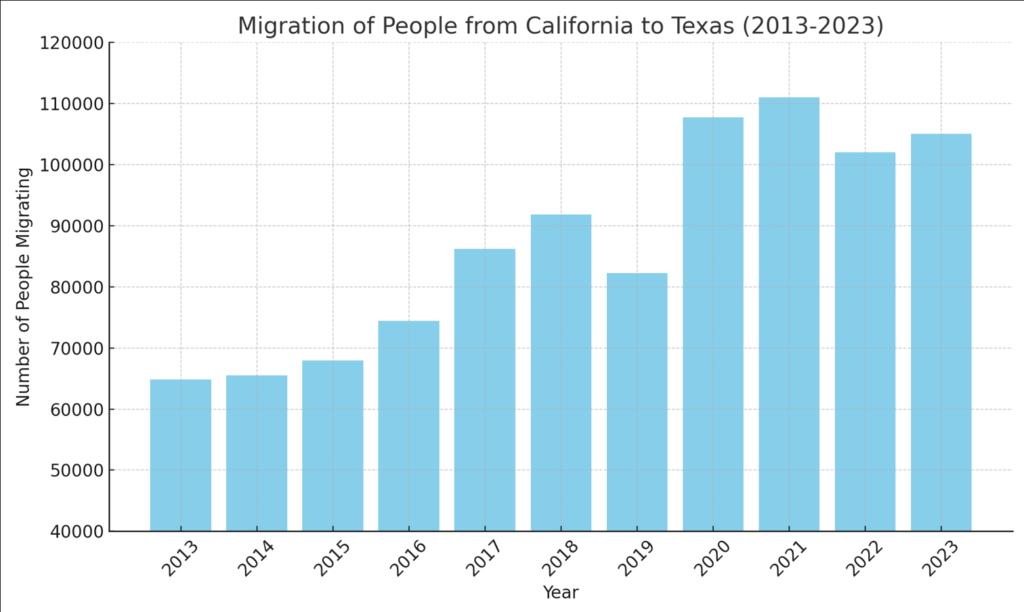Key Takeaways
- Californians Moving to Texas: 111,000 Californians moved to Texas last year, many to Austin for its tech scene and culture.
- Housing Market Challenges: Pandemic boom led to overpayments; market flipped in 2022, causing financial issues for recent buyers.
- Cultural Adjustments: Texans have unique traditions; newcomers may need to adapt to things like high school football and barbecue culture.
- Cost of Living: Austin’s lower cost of living is attractive, but high cooling costs and Texas’ no state income tax are key factors.
- Research and Expectations: Thorough research and managing expectations are crucial for those considering a move to Austin.
Recent data from the US Census indicates that 111,000 Californians relocated to Texas last year. To give you a sense of scale, that’s comparable to transplanting a city the size of Dearborn, Michigan, or Tuscaloosa, Alabama, into the heart of Texas. The pandemic saw even greater numbers of Californians making this move. This substantial migration has piqued interest, prompting questions about why so many are moving and whether they find satisfaction in their new locales. Why do Californians REGRET moving to Austin? Explore reasons behind their return—from housing challenges to cultural shifts.
Texas’ Major Cities and Californian Migrants
Texas, a vast state, boasts five of the 13 largest cities in the United States. Austin, Houston, San Antonio, Dallas, and Fort Worth attract a considerable share of these new residents. Many Californians settling in Texas find themselves in Austin, lured by its booming tech sector and dynamic cultural scene. However, not everyone finds Austin to their liking. Today, we’ll explore the main reasons why some Californians regret relocating to Austin, based on various sources.
Case Study: Brett Alder
Brett Alder’s experience exemplifies the mixed feelings some Californians have about moving to Austin. Brett relocated from San Diego to Bee Cave, TX, a suburb west of downtown Austin set in the scenic Hill Country. His journey is noteworthy: he moved during the pandemic-induced housing boom but returned to the Bay Area within a few years. This rapid change highlights potential pitfalls and learning opportunities from his experience.
Financial and Market Context
Brett’s real estate transactions shed light on the complexities of moving during a volatile market. Over a short period, he sold two homes and bought three. Financially, selling a house in San Diego for over a million dollars gave him significant cash reserves to bring to Austin. The pandemic housing boom triggered fierce bidding wars, often without inspections, a scenario Brett encountered. These factors led to repair challenges and resale difficulties, common issues during that time.
Related Articles
10 Reasons Why Austin is Not the California of Texas
This article outlines ten reasons why Austin, Texas, does not live up to its reputation as the “California of Texas.” Despite expectations of a similar lifestyle, Alder found that Austin has significant drawbacks compared to California. Key issues include higher utility costs, extreme heat, limited public spaces, and a lack of the coastal environment that defines much of California living. These factors led Alder to regret his move and serve as cautionary points for others considering the same transition.
What I’d Do Differently After Moving from California to Austin, Texas
Brett Alder reflects on his move from California to Austin, Texas, noting significant challenges and regrets. He highlights that, despite the allure of lower taxes and living costs, the realities of extreme heat, higher utility bills, and a lack of public amenities made the move less advantageous. Alder advises others considering the move to carefully weigh these factors and manage expectations to avoid similar disappointments.
Sales Exec Moved Family from California to Texas, Jokes ‘Brett’ is the New ‘Karen’
Brett Alder, a sales executive, moved his family from California to Texas and shared his dissatisfaction with the relocation. His comments about the rude locals and the harsh climate in Austin led to widespread criticism, with some people humorously labeling him the male equivalent of a ‘Karen.’ Despite his grievances, the article reflects on the broader challenges and mixed experiences faced by those moving from California to Texas.
Market Changes and Impact on Sellers
The housing market experienced dramatic shifts between 2020 and 2022. During this time, interest rates more than doubled, drastically altering the real estate landscape. This sharp increase in borrowing costs cooled the once scorching housing market, leading to a decline in home sales and prices. Sellers who purchased at the market’s peak, like Brett, struggled to recover their investments when they decided to sell.
Decline in Home Prices and Blame Distribution
As home prices in the Austin metro area declined, many sellers faced tough situations. Those who had paid $100,000 to $200,000 over the asking price in 2020 found it hard to get the same return on investment in 2022. Blame for this predicament can be attributed to various factors: the market conditions, the city of Austin, and even the realtors. However, these experiences were not unique to Austin and were common across the United States during this period.
Brett’s Disappointments
Brett’s story underscores the importance of managing expectations when relocating. One of his primary disappointments was the lack of beaches and mountains in Texas, which he missed after living in California. While Austin doesn’t have these natural features, it offers its own attractions. Zilker Park, Barton Springs Pool, Lake Travis, and Hamilton Pool Preserve provide ample outdoor activities that many locals and visitors enjoy.
Comparison to California
Despite these attractions, Brett’s comparison to California’s public lands reveals unmet expectations. California is famed for its vast public lands and outdoor recreational opportunities. In contrast, Brett felt Texas offered less, though Austin has several beautiful parks and recreational areas. The difference in landscapes and available activities can be a significant adjustment for those accustomed to California’s natural offerings.
Financial Benefits and Complaints
One of the main reasons Californians like Brett move to Austin is the lower cost of living. In Austin, he purchased a larger home in Bee Cave for about half the cost of his San Diego property. This financial benefit is a strong draw, making Austin appealing for those looking to maximize their financial resources. However, Brett expressed frustration with high cooling costs in Austin, particularly during the hottest summer in recent years.
Unmentioned Higher Taxes and Cooling Costs
What Brett didn’t highlight was the higher state taxes in California, which he would have avoided by staying in Texas. Returning to the Bay Area, he would face graduated state income taxes, significantly impacting his finances. While cooling costs in Austin might be high, the overall tax savings could offset these expenses. This aspect underscores the need to consider all financial implications when comparing living costs between states.
Texas Culture
Cultural differences can significantly impact the adjustment process for new residents. Understanding and embracing local culture is crucial. In Texas, high school football is almost a religion, and many locals have deep-rooted traditions that might be unfamiliar to newcomers. For example, some Texans might know more about horse care than coding, and breakfast tacos and barbecue are staple foods. These cultural nuances are part of what makes Texas unique and can be an adjustment for those from different backgrounds.
Austin’s Uniqueness
Austin itself has a distinct vibe compared to the rest of Texas. Known for its vibrant music scene, tech industry, and liberal attitudes, it offers a different experience from more traditional Texan cities. However, it’s still very much part of Texas, with its history and traditions. The anecdote about the Battle Flag during the Texas Revolution, where Texans told the Mexicans to “Come and take it,” exemplifies the resilient and independent spirit of the region.
Varied Opinions and Research Importance
Opinions about Austin vary widely, and everyone is entitled to their own. Some may love the city’s charm and opportunities, while others may find it lacking. Therefore, it’s crucial for anyone considering a move to do thorough research. Reading multiple sources and gathering diverse perspectives can help individuals make informed decisions and set realistic expectations.
Understanding Austin and Offer of Help
Understanding Austin’s place within Texas and its unique characteristics is essential for anyone contemplating a move. If you’re thinking about moving to Austin, I’m here to help in any way I can. You might also find this video on housing options along the Red Line Transit rail informative, offering insights into the available real estate in the area.
| Year | Number of People Migrating |
|---|---|
| 2013 | 64,848 |
| 2014 | 65,546 |
| 2015 | 67,985 |
| 2016 | 74,427 |
| 2017 | 86,164 |
| 2018 | 91,773 |
| 2019 | 82,235 |
| 2020 | 107,689 |
| 2021 | 111,000 |
| 2022 | 102,000 |
| 2023 | 105,000 |


